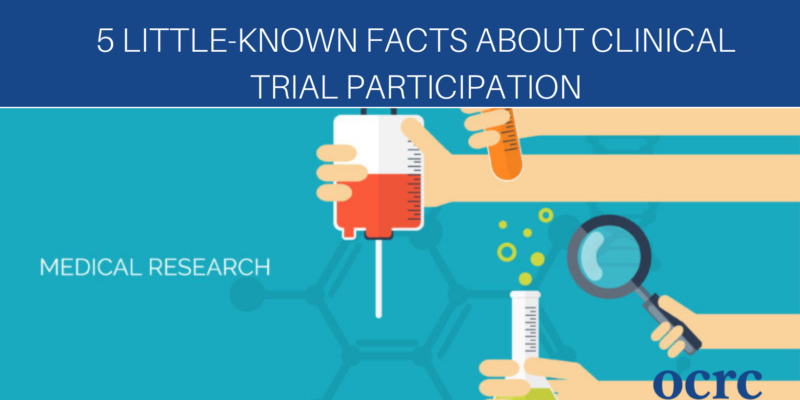
May 20 is International Clinical Trials Day, a celebration of the first controlled clinical trial conducted by James Lind in 1747 in order to find a cure for sailors suffering from scurvy.
Since then, researchers have undergone continuous medical breakthroughs. In fact, every FDA-approved treatment or medication that you take is direct result of research conducted in clinical trials. Of course, these clinical trials would not be possible without the participation of patient volunteers.
Participating in a clinical trial can help you play a role in improving the health of millions. Read on to learn five little-known facts about clinical trial participation.
Thanks to the Clinical Trial Participant Bill of Rights, participation in a clinical trial is always voluntary. The Bill of Rights has several mandatory safeguards in place to protect participants from harmful side effects or unfair treatment; it also states that participants are allowed to ask questions at any time throughout the clinical trial. This means that if you change your mind due to learning new information, or are simply no longer interested in continuing, you are allowed to drop out at any time—regardless of the stage of the clinical trial.
That being said, it is important to talk to your doctor or a research expert about how quitting the study may affect your health and future treatment options.
You don’t need to live near a big hospital in order to participate in clinical trials. Depending on the study, clinical trials can be located in hospitals, doctors’ offices, universities, patients’ homes, and even virtually.
You also don’t necessarily need a specific diagnosis. While each study has different criteria for participation, the inclusionary and exclusionary criteria (qualifying and disqualifying factors) can vary. Criteria can include but is not limited to age, sex, location, diagnosis, and medical history.
Regardless of your location and diagnosis, with enough research you should be able to find a clinical trial in need of your help.
Clinical trials are not always researching new drug treatments or medications. Some studies focus on the impact of exercise, physical therapy, diet, and other non-invasive treatments, including medical devices.
If you do happen to participate in a study that is researching a specific drug or medication, keep in mind that you may be given a placebo instead of the actual drug in question.
Data collected in clinical trials should represent the population as a whole. This is especially important because some populations have physiological and metabolic differences. As such, not everyone responds to diseases and medications in the same way.
If a clinical trial only consists of white participants, then the study is only evaluating the drug’s effect on white patients. In order to improve the health of minorities, minorities must also be represented in clinical trials. According to the National Institute of Health and Health Disparities, though, less than 10 percent of clinical trial participants are minorities.
People of all ethnicities, ages, and backgrounds are encouraged to participate in clinical trials. Improving diversity and minority representation in clinical trials will help to improve the health of minorities in the long run.
From the first stages of submitting an application to obtaining FDA approval, clinical trials are carefully regulated. Even after a drug or treatment is approved and available to the public, it will undergo continuous monitoring to ensure its safety and efficacy.
For example, every clinical trial is reviewed by Ethical Review Boards (ERBs) to ensure it meets all ethical requirements. The Institutional Review Boards (IRBs) also reviews the study to ensure all strict regulatory requirements are met. IRBs review clinical trial protocols before they even begin, and evaluate participant representation (especially making sure that minorities are fairly represented).
95 percent of clinical trial participants would be willing to participate in another study; 91 percent of those participants describe their experience positively. If you are interested in participating in a clinical trial, contact us today to get more information about current studies and eligibility requirements.
